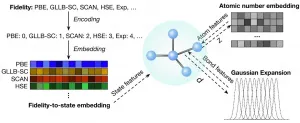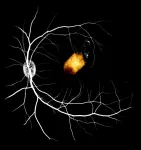Study gauges psychological impact of COVID-19 pandemic on university students
2021-01-14
(Press-News.org) More than half of all university students in the United States have experienced high levels of psychological impact from the COVID-19 pandemic, according to a new study published in the open-access journal PLOS ONE by Matthew Browning of Clemson University, US, and colleagues.
University students are increasingly recognized as a psychologically vulnerable population, suffering from higher levels of depression, anxiety, substance abuse and disordered eating compared to the general population. Moreover, college students have been among the most strongly affected by COVID-19 because of uncertainty regarding academic success, future careers and social life during college, among other concerns.
In the new study, researchers collected data on 2,534 students from seven U.S. universities using web-based questionnaires carried out between mid-March and early-May 2020. The sampling population varied between universities, in some cases spanning all undergraduate and graduate students and in other cases limited to students enrolled in particular college or courses. Sociodemographic factors were self-reported and questions on the impacts of COVID-19 on students included both open-ended and multiple-choice items.
Respondents were 61% female, 79% non-Hispanic Whites and 20% graduate students. All students surveyed reported being negatively impacted by the pandemic in some way, and 59% of respondents experienced high levels of psychological impact. Being female, non-Hispanic Asian, in fair/poor health, of below-average family income, or knowing someone infected with COVID-19 was associated with higher levels of psychological impact. Students who were non-Hispanic White, of higher socioeconomic status, or spent at least two hours a day outside had lower levels of psychological impact. The authors recommend that, based on the results, university administrators should take aggressive, proactive steps to support the mental health and educational success of their students during the pandemic to prevent long-term consequences on their health and education.
The authors add: "Certain demographic groups were at higher risk of mental health issues than others. Individuals more likely to be in the high risk group were women, younger students, students with pre-existing health conditions, and students who knew someone infected with COVID-19. Lower-income students and Asian students also appeared to be at higher risk. Certain lifestyle factors might influence risk of mental health issues too. For example, students who spent 8+ hours a day engaged in "screen time" were likely to experience higher levels of psychological impacts, while students who engaged in 2+ hours of "outdoor time" were more likely to be in the low risk group. In addition to concerns about physical health and transmission risks, universities need to acknowledge the significant toll the COVID-19 pandemic is taking on the mental health of college students. And they need to allocate time and resources to address it. We have to be creative to address this unique and unprecedented problem."
INFORMATION:
Citation: Browning MHEM, Larson LR, Sharaievska I, Rigolon A, McAnirlin O, Mullenbach L, et al. (2021) Psychological impacts from COVID-19 among university students: Risk factors across seven states in the United States. PLoS ONE 16(1): e0245327. doi:10.1371/journal.pone.0245327
Funding: The author(s) received no specific funding for this work.
Competing Interests: The authors have declared that no competing interests exist.
In your coverage please use this URL to provide access to the freely available article in PLOS ONE: https://journals.plos.org/plosone/article?id=10.1371/journal.pone.0245327
ELSE PRESS RELEASES FROM THIS DATE:
2021-01-14
Investors who bet on tropical forest conservation and reforestation to solve global warming by storing carbon in wood face huge uncertainties because the science behind predicting carbon stocks is still shaky. Even the best Earth Systems Models fail to predict how carbon stored by tropical forests varies from place to place. The New Phytologist invites scientists doing the "most-exciting, ground-breaking research" to review timely topics in a way that non-scientists can understand. Helene Muller-Landau, staff scientist at the Smithsonian Tropical Research Institute (STRI) was chosen to write the authoritative Tansley Review ...
2021-01-14
MIAMI--Scientists used a 600-year-old marine sponge to reconstruct a record of ocean temperature in the North Atlantic revealing past volcanic activity as well as the current global warming trend from the release of carbon dioxide and other heat trapping gasses into Earth's atmosphere and absorbed by the oceans.
The University of Miami (UM) Rosenstiel School of Marine and Atmospheric Science-led research team used geochemical proxies to reconstruct a 600 year-long record of Atlantic Ocean temperatures from the skeleton of a sclerosponge (Ceratoporella nicholsoni).
The basketball-sized sclerosponge was ...
2021-01-14
These findings validate the significance of the previously described first threshold - the point when the damage to the acinar cells of the pancreas is sufficient to trigger the infamous inflammatory cascade (Barreto and Saccone, 2010) - while highlighting the importance of a second threshold, namely the point when a person develops clinical symptoms of the disease sufficient to warrant going to hospital.
"This transcontinental collaboration of pancreatologists drew on their vast clinical and research experience spanning decades investigating the pathophysiology and treatments ...
2021-01-14
Deep in the Brazilian Amazon River basin, scientists led by the Smithsonian's National Museum of Natural History fish research associate C. David de Santana discovered a small, river-fed lake filled with more than 100 adult electric eels, many of which were upwards of 4 feet long. On its own, this was an intriguing discovery, electric eels--a type of knifefish rather than true eels--were thought to be solitary creatures.
But in this lake along the banks of the Iriri River in Brazil's state of Pará, the researchers witnessed the eels working together to herd small fish called tetras into tightly packed balls. Then groups of up to ...
2021-01-14
Underwater seagrass meadows may trap, extract and carry marine plastic debris to shore, thereby helping to remove plastic litter from the sea, according to a study published in Scientific Reports.
Previous research suggested that most plastics end up in the seafloor and that some are washed back to shore; however, how this occurs was unclear.
Seagrass meadows are widespread in shallow coastal waters and are involved in trapping and binding sediment particles that form the seabed. To assess the role that seagrass may have in trapping and removing marine plastic, Anna Sanchez-Vidal and colleagues measured the amount of plastic debris collected from seagrass litter ...
2021-01-14
Advancements in energy technologies, healthcare, semiconductors and food production all have one thing in common: they rely on developing new materials--new combinations of atoms--that have specific properties enabling them to perform a needed function. In the not-too-distant past, the only way to know what properties a material had was by performing experimental measurements or using very expensive computations.
More recently, scientists have been using machine learning algorithms to rapidly predict the properties that certain arrangements of atoms would have. The challenge with this approach is it requires a lot of highly accurate data to train the model, which often does not exist.
By combining large ...
2021-01-14
Retinal cells derived from adult human eye stem cells survived when transplanted into the eyes of monkeys, an important early step in the validation of this approach for treating blindness, according to a study by Liu, et al recently published in Stem Cell Reports. The retinal pigment epithelium (RPE), a layer of pigmented cells in the retina, is essential for sustaining normal vision. Blindness due to RPE dysfunction, such as macular degeneration, affects about 200 million people worldwide.
To restore this population of cells, researchers extracted retinal stem cells from donated cadaver adult eyes, grew them into RPE cells and transplanted them into the eyes of monkeys. ...
2021-01-14
Retinal cells derived from a cadaver human eye survived when transplanted into the eyes of primate models, an important advance in the development of cell therapy to treat blindness, according to a study published on January 14 in Stem Cell Reports.
The retinal pigment epithelium (RPE), a layer of pigmented cells in the retina, functions as a barrier and regulator in the eye to maintain normal vision. RPE dysfunction can lead to eye disorders including macular degeneration and can cause blindness, which affects about 200 million people worldwide.
To restore this population of cells, ...
2021-01-14
A major roadblock to computational design of high-entropy alloys has been removed, according to scientists at Iowa State University and Lehigh University. Engineers from the Ames Lab and Lehigh University's Department of Mechanical Engineering and Mechanics have developed a process that reduces search time used for predictive design 13,000-fold.
According to Ganesh Balasubramanian, an associate professor at Lehigh, the goal of the team's research was to accelerate the computational modeling of complex alloys. The tools available for creating random distribution of atoms in materials simulation models, he says, have been used for many, many years now and are limited in ...
2021-01-14
What The Study Did: The number of patients undergoing cancer screening tests and of subsequent cancer diagnoses during the COVID-19 pandemic in the largest health care system in the northeastern United States was assessed in this study.
Authors: Toni K. Choueiri, M.D., of the Dana-Farber Cancer Institute and Quoc-Dien Trinh, M.D., of Brigham and Women's Hospital in Boston, are the corresponding authors.
To access the embargoed study: Visit our For The Media website at this link https://media.jamanetwork.com/
(doi:10.1001/jamaoncol.2020.7600)
Editor's Note: The article includes conflict ...
LAST 30 PRESS RELEASES:
[Press-News.org] Study gauges psychological impact of COVID-19 pandemic on university students





